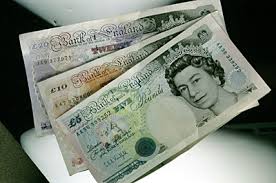Tuesday, 07 July 2015 17:20
 LONDON: Sterling fell to a three-week low against the dollar on Tuesday, suffering along with other European currencies from a jump in the greenback’s value as interest rate differentials moved in its favour.
LONDON: Sterling fell to a three-week low against the dollar on Tuesday, suffering along with other European currencies from a jump in the greenback’s value as interest rate differentials moved in its favour.
Mixed data on UK industrial and manufacturing output, which is often secondary to services sector numbers in terms of impact on the country’s economic growth, gave markets little steer on when the Bank of England could raise interest rates. The pound, however, has proved relatively steady as the euro zone’s Greek crisis worsened and gained about half a percent to 70.72 pence per euro on Tuesday. Against the dollar, it fell 0.6 percent to $ 1.5503.
“The broader picture here is that the UK economy is still performing relatively well, growth is rebounding and that is good for sterling,” said Lee Hardman, a strategist with Bank of Tokyo-Mitsubishi UFJ in London.
“The real risk on the horizon is the economic shock of a Grexit. That will be negative for the euro, and negative for sterling, but to a lesser extent, so we would expect sterling to gain against the euro but fall against the dollar.”
Another signal on the UK economy, and whether Britain’s central bank might move this year or early next year, may come from the latest update from the National Institute of Economic and Social Research, an independent think-tank, on its forecasts for gross domestic product due later on Tuesday.
“There is now clear upside risk to our second-quarter growth forecast of 0.5 percent quarter on quarter, although construction output data for May on Friday could alter that assessment,” RBC economist Sam Hill said after the output data. Bank of Tokyo-Mitsubishi’s Hardman, like a number of analysts, said there could be outflows from the euro zone into safe-haven assets if it becomes clear that Greece is heading out of the currency union.
European market moves have been relatively muted since Sunday’s resounding rejection by Greeks of the austerity measures demanded by euro zone leaders in return for more financial aid.
Greek Prime Minister Alexis Tsipras is expected to present new proposals to an emergency euro zone summit on Tuesday, under pressure from European leaders to come up with credible ideas as his country’s banks face potential meltdown.
“The markets seem quite relaxed, which I think raises the probability that Greece leaves the euro zone,” said Mike Cirami, co-director of global income at US asset manager Eaton Vance. “If we saw a lot of contagion in the marketplace, I think policymakers would be thinking about things differently.
But I do wonder if its more that markets are a deer in the headlights; people are paralysed and can’t react and then all of a sudden we will see big moves.”




























